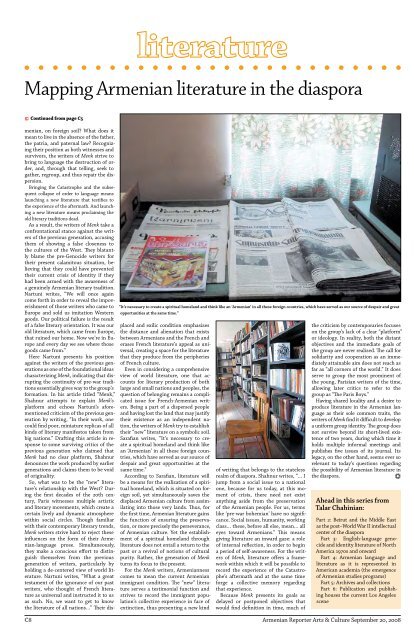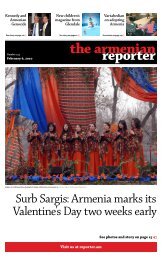Leo Chaloukian: All the way to Tinseltown - Armenian Reporter
Leo Chaloukian: All the way to Tinseltown - Armenian Reporter
Leo Chaloukian: All the way to Tinseltown - Armenian Reporter
Create successful ePaper yourself
Turn your PDF publications into a flip-book with our unique Google optimized e-Paper software.
Mapping <strong>Armenian</strong> literature in <strong>the</strong> diaspora<br />
n Continued from page C5<br />
“It’s necessary <strong>to</strong> create a spiritual homeland and think like an ‘<strong>Armenian</strong>’ in all <strong>the</strong>se foreign countries, which have served as our source of despair and great<br />
opportunities at <strong>the</strong> same time.”<br />
menian, on foreign soil? What does it<br />
mean <strong>to</strong> live in <strong>the</strong> absence of <strong>the</strong> fa<strong>the</strong>r,<br />
<strong>the</strong> patria, and paternal law? Recognizing<br />
<strong>the</strong>ir position as both witnesses and<br />
survivors, <strong>the</strong> writers of Menk strive <strong>to</strong><br />
bring <strong>to</strong> language <strong>the</strong> destruction of order,<br />
and, through that telling, seek <strong>to</strong><br />
ga<strong>the</strong>r, regroup, and thus repair <strong>the</strong> dispersion.<br />
Bringing <strong>the</strong> Catastrophe and <strong>the</strong> subsequent<br />
collapse of order <strong>to</strong> language means<br />
launching a new literature that testifies <strong>to</strong><br />
<strong>the</strong> experience of <strong>the</strong> aftermath. And launching<br />
a new literature means proclaiming <strong>the</strong><br />
old literary traditions dead.<br />
As a result, <strong>the</strong> writers of Menk take a<br />
confrontational stance against <strong>the</strong> writers<br />
of <strong>the</strong> previous generation, accusing<br />
<strong>the</strong>m of showing a false closeness <strong>to</strong><br />
<strong>the</strong> cultures of <strong>the</strong> West. They blatantly<br />
blame <strong>the</strong> pre-Genocide writers for<br />
<strong>the</strong>ir present calami<strong>to</strong>us situation, believing<br />
that <strong>the</strong>y could have prevented<br />
<strong>the</strong>ir current crisis of identity if <strong>the</strong>y<br />
had been armed with <strong>the</strong> awareness of<br />
a genuinely <strong>Armenian</strong> literary tradition.<br />
Nartuni writes, “We will once again<br />
come forth in order <strong>to</strong> reveal <strong>the</strong> impoverishment<br />
of those writers who came <strong>to</strong><br />
Europe and sold us imitation Western<br />
goods. Our political failure is <strong>the</strong> result<br />
of a false literary orientation. It was our<br />
old literature, which came from Europe,<br />
that ruined our home. Now we’re in Europe<br />
and every day we see where those<br />
goods came from.”<br />
Here Nartuni presents his position<br />
against <strong>the</strong> writers of <strong>the</strong> previous generations<br />
as one of <strong>the</strong> foundational ideas<br />
characterizing Menk, indicating that disrupting<br />
<strong>the</strong> continuity of pre-war traditions<br />
essentially gives <strong>way</strong> <strong>to</strong> <strong>the</strong> group’s<br />
formation. In his article titled “Menk,”<br />
Shahnur attempts <strong>to</strong> explain Menk’s<br />
platform and echoes Nartuni’s aforementioned<br />
criticism of <strong>the</strong> previous generation<br />
by writing, “In <strong>the</strong>ir work, one<br />
could find poor, miniature replicas of all<br />
kinds of literary manifes<strong>to</strong>s taken from<br />
big nations.” Drafting this article in response<br />
<strong>to</strong> some surviving critics of <strong>the</strong><br />
previous generation who claimed that<br />
Menk had no clear platform, Shahnur<br />
denounces <strong>the</strong> work produced by earlier<br />
generations and claims <strong>the</strong>m <strong>to</strong> be void<br />
of originality.<br />
So, what was <strong>to</strong> be <strong>the</strong> “new” literature’s<br />
relationship with <strong>the</strong> West? During<br />
<strong>the</strong> first decades of <strong>the</strong> 20th century,<br />
Paris witnesses multiple artistic<br />
and literary movements, which create a<br />
certain lively and dynamic atmosphere<br />
within social circles. Though familiar<br />
with <strong>the</strong>ir contemporary literary trends,<br />
Menk writers strive hard <strong>to</strong> reject <strong>the</strong>se<br />
influences on <strong>the</strong> form of <strong>the</strong>ir <strong>Armenian</strong>-language<br />
prose. Simultaneously,<br />
<strong>the</strong>y make a conscious effort <strong>to</strong> distinguish<br />
<strong>the</strong>mselves from <strong>the</strong> previous<br />
generation of writers, particularly by<br />
holding a de-centered view of world literature.<br />
Nartuni writes, “What a great<br />
testament of <strong>the</strong> ignorance of our past<br />
writers, who thought of French literature<br />
as universal and instructed it <strong>to</strong> us<br />
as such. No, we want <strong>to</strong> get <strong>to</strong> know<br />
<strong>the</strong> literature of all nations…” Their displaced<br />
and exilic condition emphasizes<br />
<strong>the</strong> distance and alienation that exists<br />
between <strong>Armenian</strong>s and <strong>the</strong> French and<br />
erases French literature’s appeal as universal,<br />
creating a space for <strong>the</strong> literature<br />
that <strong>the</strong>y produce from <strong>the</strong> peripheries<br />
of French culture.<br />
Even in considering a comprehensive<br />
view of world literature, one that accounts<br />
for literary production of both<br />
large and small nations and peoples, <strong>the</strong><br />
question of belonging remains a complicated<br />
issue for French-<strong>Armenian</strong> writers.<br />
Being a part of a dispersed people<br />
and having lost <strong>the</strong> land that may justify<br />
<strong>the</strong>ir existence as an independent nation,<br />
<strong>the</strong> writers of Menk try <strong>to</strong> establish<br />
<strong>the</strong>ir “new” literature on a symbolic soil.<br />
Sarafian writes, “It’s necessary <strong>to</strong> create<br />
a spiritual homeland and think like<br />
an ‘<strong>Armenian</strong>’ in all <strong>the</strong>se foreign countries,<br />
which have served as our source of<br />
despair and great opportunities at <strong>the</strong><br />
same time.”<br />
According <strong>to</strong> Sarafian, literature will<br />
be a means for <strong>the</strong> realization of a spiritual<br />
homeland, which is situated on foreign<br />
soil, yet simultaneously saves <strong>the</strong><br />
displaced <strong>Armenian</strong> culture from assimilating<br />
in<strong>to</strong> those very lands. Thus, for<br />
<strong>the</strong> first time, <strong>Armenian</strong> literature gains<br />
<strong>the</strong> function of ensuring <strong>the</strong> preservation,<br />
or more precisely <strong>the</strong> perseverance,<br />
of <strong>Armenian</strong> culture. Yet <strong>the</strong> establishment<br />
of a spiritual homeland through<br />
literature does not entail a return <strong>to</strong> <strong>the</strong><br />
past or a revival of notions of cultural<br />
purity. Ra<strong>the</strong>r, <strong>the</strong> generation of Menk<br />
turns its focus <strong>to</strong> <strong>the</strong> present.<br />
For <strong>the</strong> Menk writers, <strong>Armenian</strong>ness<br />
comes <strong>to</strong> mean <strong>the</strong> current <strong>Armenian</strong><br />
immigrant condition. The “new” literature<br />
serves a testimonial function and<br />
strives <strong>to</strong> record <strong>the</strong> immigrant population’s<br />
collective experience in face of<br />
extinction, thus presenting a new kind<br />
of writing that belongs <strong>to</strong> <strong>the</strong> stateless<br />
realm of diaspora. Shahnur writes, “… I<br />
jump from a social issue <strong>to</strong> a national<br />
one, because for us <strong>to</strong>day, at this moment<br />
of crisis, <strong>the</strong>re need not exist<br />
anything aside from <strong>the</strong> preservation<br />
of <strong>the</strong> <strong>Armenian</strong> people. For us, terms<br />
like ‘pre-war bohemian’ have no significance.<br />
Social issues, humanity, working<br />
class… <strong>the</strong>se, before all else, mean… all<br />
eyes <strong>to</strong>ward <strong>Armenian</strong>s.” This means<br />
giving literature an inward gaze: a role<br />
of internal reflection, in order <strong>to</strong> begin<br />
a period of self-awareness. For <strong>the</strong> writers<br />
of Menk, literature offers a framework<br />
within which it will be possible <strong>to</strong><br />
record <strong>the</strong> experience of <strong>the</strong> Catastrophe’s<br />
aftermath and at <strong>the</strong> same time<br />
forge a collective memory regarding<br />
that experience.<br />
Because Menk presents its goals as<br />
delayed or postponed objectives that<br />
would find definition in time, much of<br />
<strong>the</strong> criticism by contemporaries focuses<br />
on <strong>the</strong> group’s lack of a clear “platform”<br />
or ideology. In reality, both <strong>the</strong> distant<br />
objectives and <strong>the</strong> immediate goals of<br />
<strong>the</strong> group are never realized. The call for<br />
solidarity and cooperation as an immediately<br />
attainable aim does not reach as<br />
far as “all corners of <strong>the</strong> world.” It does<br />
serve <strong>to</strong> group <strong>the</strong> most prominent of<br />
<strong>the</strong> young, Parisian writers of <strong>the</strong> time,<br />
allowing later critics <strong>to</strong> refer <strong>to</strong> <strong>the</strong><br />
group as “The Paris Boys.”<br />
Having shared locality and a desire <strong>to</strong><br />
produce literature in <strong>the</strong> <strong>Armenian</strong> language<br />
as <strong>the</strong>ir sole common traits, <strong>the</strong><br />
writers of Menk find it difficult <strong>to</strong> develop<br />
a uniform group identity. The group does<br />
not survive beyond its short-lived existence<br />
of two years, during which time it<br />
holds multiple informal meetings and<br />
publishes five issues of its journal. Its<br />
legacy, on <strong>the</strong> o<strong>the</strong>r hand, seems ever so<br />
relevant <strong>to</strong> <strong>to</strong>day’s questions regarding<br />
<strong>the</strong> possibility of <strong>Armenian</strong> literature in<br />
<strong>the</strong> diaspora.<br />
f<br />
Ahead in this series from<br />
Talar Chahinian:<br />
Part 2: Beirut and <strong>the</strong> Middle East<br />
as <strong>the</strong> post–World War II intellectual<br />
center of <strong>the</strong> diaspora<br />
Part 3: English-language genocide<br />
and identity literature of North<br />
America 1970s and onward<br />
Part 4: <strong>Armenian</strong> language and<br />
literature as it is represented in<br />
American academia (<strong>the</strong> emergence<br />
of <strong>Armenian</strong> studies programs)<br />
Part 5: Archives and collections<br />
Part 6: Publication and publishing<br />
houses <strong>the</strong> current Los Angeles<br />
scene<br />
C8 <strong>Armenian</strong> <strong>Reporter</strong> Arts & Culture September 20, 2008

















